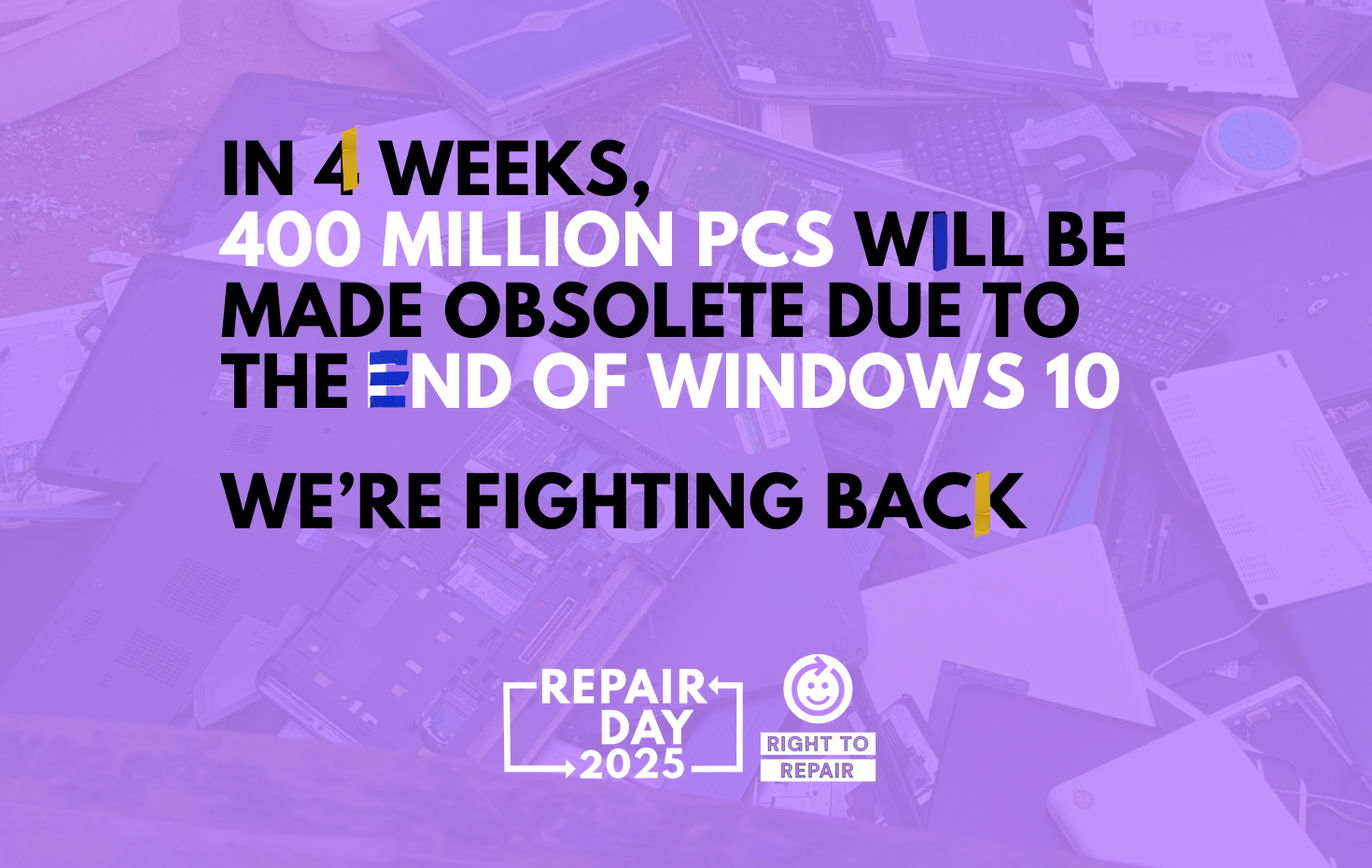This article was updated on 24 September 2025
On 14 October, Microsoft will end free support for Windows 10, pushing millions of PCs into premature obsolescence and generating avoidable e-waste. Ahead of International Repair Day (18 October), circular economy and digital rights groups worldwide are pushing back against fast tech.
Photos and a flashmob video available here
- Microsoft will end free support by default for computers running Windows 10 (almost half of all Windows computers1) on 14 October – ironically International E-Waste Day. 400 million of these computers will not be allowed to upgrade to Windows 11. This forces users to either buy new devices, join a pricey Microsoft scheme or sign-up for additional services to get a temporary extension of support, switch to an alternative operating system, or risk using unsecure software.
- As raised by Euroconsumers, linking Extended Security Updates to engagement with Microsoft’s own services equates to the tech giant self-preferencing its own offerings over those of third parties. Such Software Induced Obsolescence is incompatible with the EU Digital Markets Act’s goal of promoting fair digital ecosystems that serve users.
- Environmental cost: computers discarded as a result could generate over 700 million kg of e-waste.
- In the lead up to International Repair Day (18 October), thousands of repair events around the world are breathing new life into laptops, saving people money and cutting waste. This growing movement is proof: we don’t have to accept fast tech.
- An international coalition2 of circular economy and digital rights experts is urging Microsoft to extend free, automatic support for Windows 10 — organisations can view and co-sign the open letter here. The push is global, with national campaigns underway in France, Denmark, Germany, the US, and beyond.
- The Right to Repair Europe coalition calls on European Commissioner Jessika Roswall to protect citizens and businesses from software-driven obsolescence by introducing ambitious EU Ecodesign rules for devices like laptops. But the problem goes far beyond computers: medical equipment, smartwatches, smart home devices such as thermostats, lights, and cookers — even toys — are all affected.3
Cristina Ganapini, Coordinator of the Right to Repair Europe coalition, says:
“Microsoft’s decision to end support for Windows 10 could make 400 million computers obsolete — not because they’re broken, but because of software. Companies can do this because there are no regulations to stop them. We call on European Commissioner Jessika Roswall to introduce EU Ecodesign requirements for laptops, guaranteeing at least 15 years of software updates. We also urge the Commission to set strong horizontal requirements on minimum durability and repairability, with software and security support to match the potential lifespan – not just for computers, but for all products with a plug or battery. No more devices designed to break or become obsolete before their time.”
Ugo Vallauri, Co-Director, The Restart Project, says:
“On International Repair Day we celebrate the power of communities around the world to resist premature obsolescence, implementing alternatives and sharing skills to protect people and the planet from manufacturers‘ throwaway approaches. Meanwhile ironically the end of Windows 10 support coincides with ‘E-waste Day’. We need Microsoft to extend free, automatic support for Windows 10. And we demand legislation in the EU and elsewhere to make software obsolescence illegal for all products.”
Background
International Repair Day is celebrated on the third Saturday of October, and it exists to celebrate the power of community repair to prevent waste, reduce emissions and share skills. Beyond community repair, International Repair Day celebrates local repair shops, people taking initiative to say no to electrical waste, as well as companies that provide repair information, spare parts and tools.
For the majority of products that are brought to community events or fixed at high street repair shops, the bulk of their environmental impact occurs during manufacturing – before they are even used.
Mining materials, producing and assembling components, packaging and transportation all contribute to the massive amount of carbon emissions that are produced by imported products.
Notes
- https://gs.statcounter.com/os-version-market-share/windows/desktop/worldwide ↩︎
- Right to Repair Europe, Halte à l’Obsolescence Programmée, U.S. PIRG, Repair.org, iFixit, and more ↩︎
- https://pirg.org/edfund/resources/electronic-waste-graveyard/ ↩︎
Contact information
Cristina Ganapini, Coordinator, Right to Repair Europe, info@repair.eu

